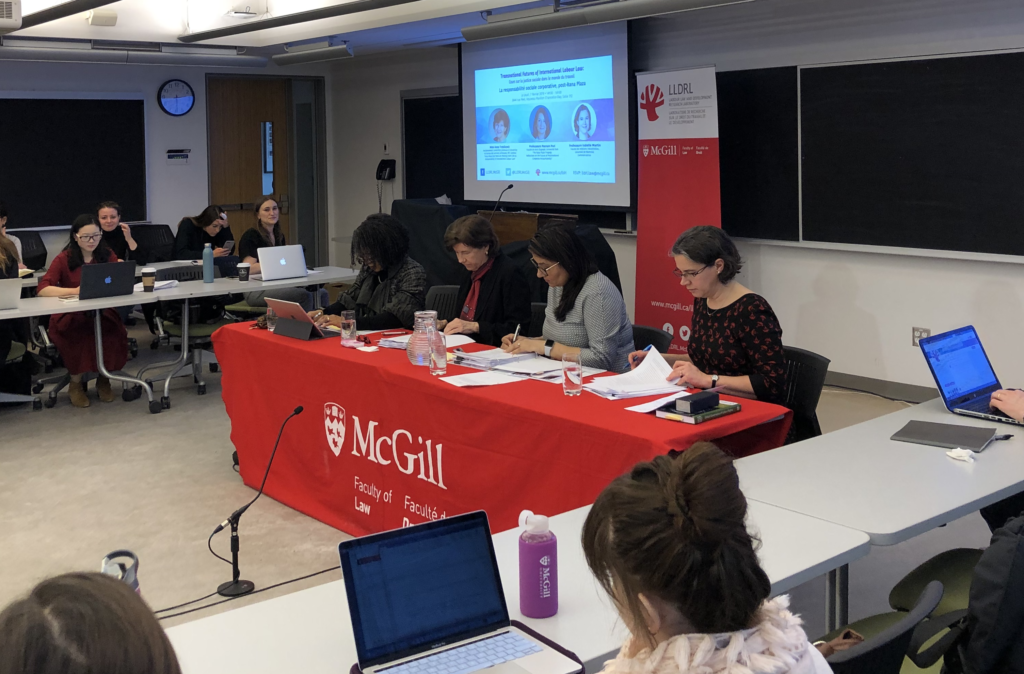
Nora Cole is a Project Manager at Atkinson. Given her academic background in policy and governance, she jumped at the chance to tune into Professor Adelle Blackett’s course on Transnational Futures of International Labour Law and think through what it means for Atkinson’s work.
I turned 30 last year. As my birthday approached, my loved ones gently asked “and how are you feeling about it?” Any important date – a birthday, an anniversary, a milestone – is a moment to ask hard existential and practical questions:
- Am I where I thought I would be?
- What am I doing now? Is it important?
- Where do I go next?
While I didn’t love all the answers, taking time to reflect allowed me to enter my 30s with a renewed sense of purpose. A mixture of “you did okay, kid” and “here’s what you should do next.”
The decent work movement is marking a few important milestones this year. In Canada, it’s the 100th anniversary of the Winnipeg General Strike. Globally, the International Labour Organization turns 100. Dr. Adelle Blackett organized a weekly online course at McGill University to celebrate this centenary starting in January 2019. Transnational Futures of International Labour Law was offered free-of-charge to students like me everywhere thanks to the university and the Pierre Elliott Trudeau Foundation. I listened to brilliant scholars and practitioners from around the world talk about labour law — where we’ve come from, where we are at, and where we need to go. (You can check out all the lectures here). Now that the four-month course has come to an end, I’d like to share a few reflections.
The mission of social justice is as relevant today as it was in 1919
The ILO was founded based on the belief that universal and lasting peace can only be achieved if it’s based on social justice. It was founded to advance the rights of working people and ensure that workplaces were safe, as work changed with rapid industrialization.
Dr. Larry Helfer described the gap between the rhetoric and results: major progress has been made in defining labour standards and ensuring passage of labour laws around the world; but translating laws on the books to laws in action has been slower. Around the world, including in Canada and Ontario, many workers are still fighting for equal pay, safe working conditions, and respect in the workplace. Additionally, labour laws are out of date for the new world of work. But as we continue in this good fight, social and economic justice is still our north star.
Not all voices are included, so organizing continues
When the ILO was founded, having non-state actors, unions and employers, around the table was revolutionary. But there has been little space for non-union workers which, in a time of declining membership in organized labour, means too many workers’ voices are excluded.
The course shared many workers’ stories – from Chinese workers in Belt and Road initiatives to informal waste workers in Ghana to domestic workers around the world. While all faced exclusion from official dialogues, that rarely stopped them from speaking out. Dr. Adelle Blackett spoke about how domestic workers organized to be heard in the building of the ILO Domestic Workers Convention, 2011 (No. 189). They made space in sessions and deliberations and lifted up standards from South Africa and Uruguay, where domestic workers had fought for safe workplaces and social protection.
This organizing work also continues in Ontario. Workers and community members are leading the fight on raising the minimum wage, community benefits, and fairness for migrant caregivers and agricultural workers – and have made impressive albeit fragile gains.
The challenge for the next 100 years
Dr. Harry Arthurs pointed out that the ILO was founded in a time of upheaval: World War I was ending and worker revolts, including general strikes in Nova Scotia, Ontario and Manitoba, were challenging constitutions and laws. The ILO was envisioned as a forum to come together with social justice at its core.
Many speakers mentioned our current challenges: climate change; a global uptick in hate speech and actions; decreasing faith in governments; and continued globalization of work. We need to come together again with a new commitment to social justice. As Dr. Sabaa Khan (a Canadian who lives now in Finland) explained, the social contract has historically evaded workers in precarious positions. Dr. Blackett closed the course with this observation:
“We are in a moment where we have to unsettle, profoundly unsettle, some of the starting understandings of our field, and some of the starting asymmetries that may have given us a sense of solidarity in the past but so deeply excluding the working people of the world. We need to unsettle, some would say decolonize, before we can begin to imagine how a second centenary for social justice toward peace can be a reality.”
We’re grateful for this exceptional and “profoundly unsettling” learning opportunity, but also for the challenge to ask bigger questions and to rediscover what solidarity means in the years ahead.
